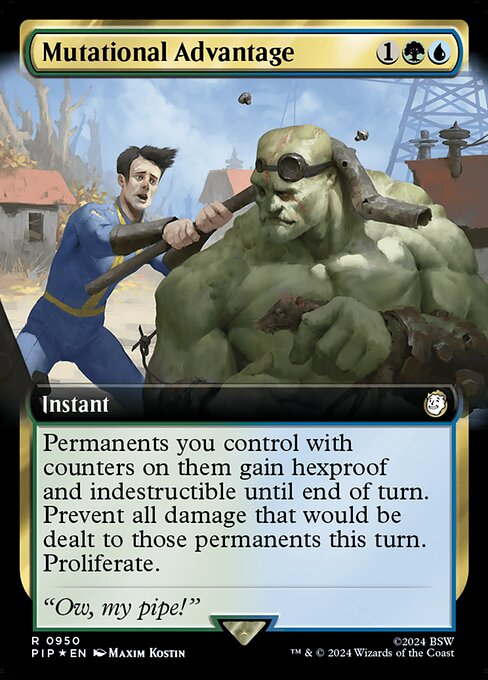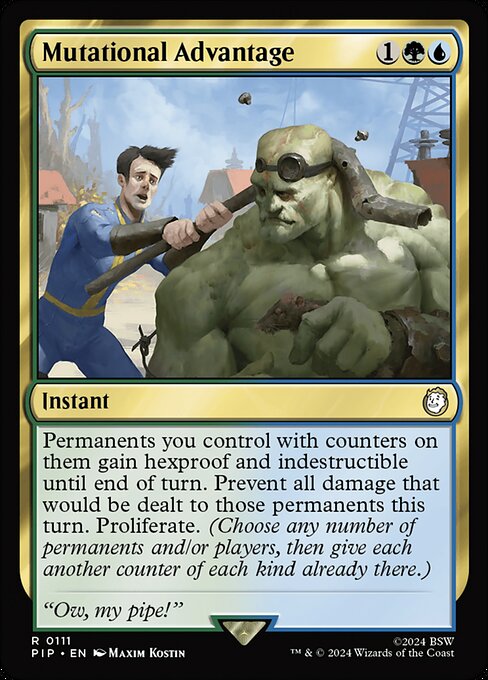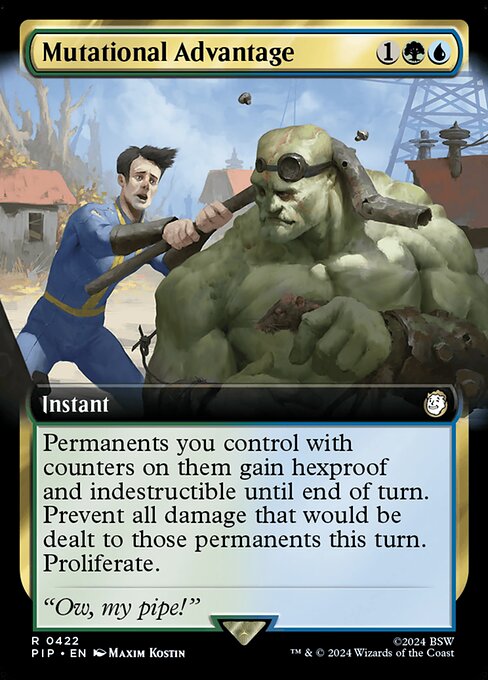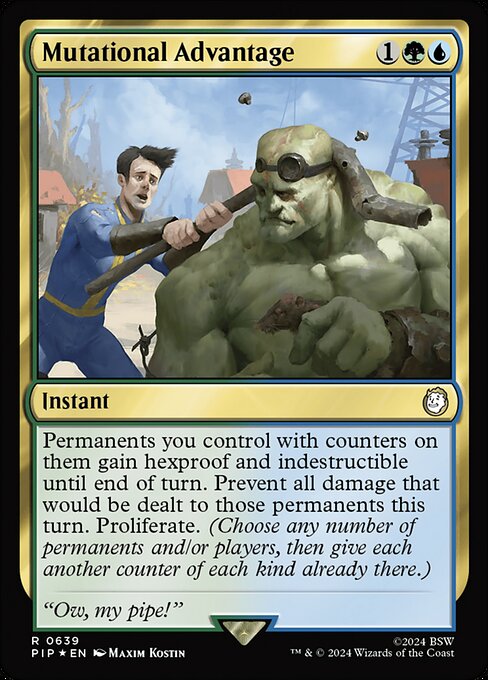Mutational Advantage
Instant
Permanents you control with counters on them gain hexproof and indestructible until end of turn. Prevent all damage that would be dealt to those permanents this turn. Proliferate. (Choose any number of permanents and/or players, then give each another counter of each kind already there.)
standard
future
historic
gladiator
pioneer
explorer
modern
legacy
pauper
vintage
penny
commander
brawl
alchemy
paupercommander
duel
oldschool
premodern
Rulings
If a player or permanent has more than one kind of counter on it, and you choose for it to get additional counters, it must get one of each kind of counter it already has. You can’t have it get just one kind of counter it already has and not the others.
Players can respond to a spell or ability whose effect includes proliferating. Once that spell or ability starts to resolve, however, and its controller chooses which permanents and players will get new counters, it’s too late for anyone to respond.
You can choose any permanent that has a counter, including ones controlled by opponents. You can choose any player who has a counter, including opponents. You can’t choose cards in any zone other than the battlefield, even if they have counters on them.
Some spells and abilities that cause you to proliferate may require targets. If each target chosen is an illegal target as that spell or ability tries to resolve, it won’t resolve. You won’t proliferate.
You don’t have to choose every permanent or player that has a counter—only the ones you want to add counters to. Since “any number” includes zero, you don’t have to choose any permanents at all, and you don’t have to choose any players at all.
The set of permanents affected by Mutational Advantage is determined at the time Mutational Advantage resolves. Permanents that gain counters later in the turn won’t become affected by this effect, and permanents that lose all of their counters later in the turn won’t stop being affected.
Players can respond to a spell or ability whose effect includes proliferating. Once that spell or ability starts to resolve, however, and its controller chooses which permanents and players will get new counters, it’s too late for anyone to respond.
You can choose any permanent that has a counter, including ones controlled by opponents. You can choose any player who has a counter, including opponents. You can’t choose cards in any zone other than the battlefield, even if they have counters on them.
Some spells and abilities that cause you to proliferate may require targets. If each target chosen is an illegal target as that spell or ability tries to resolve, it won’t resolve. You won’t proliferate.
You don’t have to choose every permanent or player that has a counter—only the ones you want to add counters to. Since “any number” includes zero, you don’t have to choose any permanents at all, and you don’t have to choose any players at all.
The set of permanents affected by Mutational Advantage is determined at the time Mutational Advantage resolves. Permanents that gain counters later in the turn won’t become affected by this effect, and permanents that lose all of their counters later in the turn won’t stop being affected.
Rulings
If a player or permanent has more than one kind of counter on it, and you choose for it to get additional counters, it must get one of each kind of counter it already has. You can’t have it get just one kind of counter it already has and not the others.
Players can respond to a spell or ability whose effect includes proliferating. Once that spell or ability starts to resolve, however, and its controller chooses which permanents and players will get new counters, it’s too late for anyone to respond.
You can choose any permanent that has a counter, including ones controlled by opponents. You can choose any player who has a counter, including opponents. You can’t choose cards in any zone other than the battlefield, even if they have counters on them.
Some spells and abilities that cause you to proliferate may require targets. If each target chosen is an illegal target as that spell or ability tries to resolve, it won’t resolve. You won’t proliferate.
You don’t have to choose every permanent or player that has a counter—only the ones you want to add counters to. Since “any number” includes zero, you don’t have to choose any permanents at all, and you don’t have to choose any players at all.
The set of permanents affected by Mutational Advantage is determined at the time Mutational Advantage resolves. Permanents that gain counters later in the turn won’t become affected by this effect, and permanents that lose all of their counters later in the turn won’t stop being affected.
Players can respond to a spell or ability whose effect includes proliferating. Once that spell or ability starts to resolve, however, and its controller chooses which permanents and players will get new counters, it’s too late for anyone to respond.
You can choose any permanent that has a counter, including ones controlled by opponents. You can choose any player who has a counter, including opponents. You can’t choose cards in any zone other than the battlefield, even if they have counters on them.
Some spells and abilities that cause you to proliferate may require targets. If each target chosen is an illegal target as that spell or ability tries to resolve, it won’t resolve. You won’t proliferate.
You don’t have to choose every permanent or player that has a counter—only the ones you want to add counters to. Since “any number” includes zero, you don’t have to choose any permanents at all, and you don’t have to choose any players at all.
The set of permanents affected by Mutational Advantage is determined at the time Mutational Advantage resolves. Permanents that gain counters later in the turn won’t become affected by this effect, and permanents that lose all of their counters later in the turn won’t stop being affected.
Votre collection ? vos decks ?
Envie de gérer votre collection et/ou créer des decks ?



 0
0
 2.39€
2.39€

